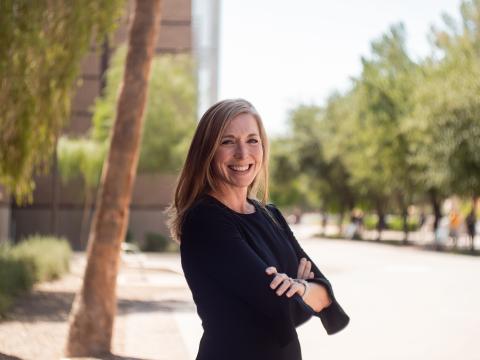
Outstanding Faculty Mentors

Leah Doane
Department of Psychology, The College of Liberal Arts and Sciences
Bio
Dr. Leah Doane is an Associate Professor and Developmental area head in the Department of Psychology. She received her Bachelor’s degree from Cornell University and her Ph.D. in Human Development and Social Policy from Northwestern University. Dr. Doane is a developmental psychologist who examines how the everyday experiences of diverse children, adolescents, and young adults are associated with physiological stress processes and sleep, and the implications of such associations for health and well-being. Her research program has three primary areas: (1) daily dynamics among perceived stress, affect, physiology, and sleep in adolescence and across the transition to college, (2) cultural and familial influences on college planning, transitions, and well-being, including the study of cultural proximal processes and physiological stress indicators, (3) genetic and environmental influences on daily health processes and academic achievement. Her newest program of research focuses on these processes in Latino youth and families. Dr. Doane’s research is generously funded by the William T. Grant Foundation, Helios Education Foundation, National Institutes of Health (NICHD), and Army Research Institute for the Behavioral and Social Sciences (ARI). Dr. Doane is the proud mentor of 9 current and former award-winning doctoral students and over 300 current and former undergraduate research assistants.
Mentoring statement
Mentoring is at the core of my academic identity as I believe that training and promoting emerging scientists is the best way to bring about discovery and change. Throughout my undergraduate and graduate training, I was fortunate to receive mentorship from successful scholars who worked tirelessly to promote my development. I added essential tools to my analytic and methodological toolbox, and I was also given the freedom to ask research questions that were exciting to me. I now have the unique opportunity as an associate professor at a large, inclusive, state institution of higher education to pass on what I have learned to a diverse generation of junior scholars.
Using the apprenticeship model, I work closely with my graduate students in both one on-one and team settings. To build individual relationships with students, as well as a lab community, I work to provide responsive guidance and scaffolded opportunities for success. In the first and second year, this includes the development of a NSF predoctoral fellowship proposal, participation as a coauthor and then first author on conference abstract submissions and manuscripts, and leading teams of undergraduate research assistants. During this time, I work closely with students to train them on different lab methods. I also pair them with more senior students to ensure multiple mentoring and learning opportunities. As students progress through the program, they take on more responsibilities including designing their own data collections, leading first author papers, and initiating collaborations with other professors at ASU and at other institutions. Beyond research training, I work extensively with my students to establish foundational skills in teaching and professional development. Many of my students have taught their own classes, led small research teams of undergraduate students, and all have had the opportunity to guest lecture. I advocate and try to help my students network and build connections so that they have opportunities to present at prestigious national conferences and even chair symposiums.
My mentorship occurs in weekly one-on-one meetings with students as well as in group research projects. In this way I can promote individual research trajectories while also allowing for collaboration and teaching at the group level within the context of large grant-funded studies. By using team-based approaches, I hope to promote a community of learning, draw on students’ individual strengths, and increase students’ sense of belonging. Indeed, each student in my lab brings with them unique funds of knowledge that help support the success of our lab community. Based on the community model, one of my favorite parts of mentoring is when I get to learn from my students and grow as a scholar myself. Sometimes this means that they are teaching me a new statistical technique, and other times it means having hard conversations if we disagree about a theoretical framework or interpretation of findings. Such conversations allow for growth in the relationship as well as our individual scholarly identities.
Over the last two years I have also received training on the mentorship of junior scholars of color from the William T. Grant Foundation. My graduate student, HyeJung Park, and I were awarded a two-year grant to support her research efforts and my training. Through formal mentorship from experts from across the country, I have learned strategies to mentor across difference in three primary areas: 1) supervising the advancement of research through promoting independence and providing protection, 2) seeking out opportunities for underrepresented scholars to further their professional development locally and nationally, and connecting students with those resources, and 3) learning how to mentor broadly (i.e., development of scholarly
identity) and narrowly (i.e., providing training on specific research techniques), including the advancement of strategies to promote balance of opportunities and resources for students who have been traditionally underrepresented in graduate training. I have also worked as the Developmental Area Head in the Department of Psychology to promote the success of junior scholars of color in our area and beyond. This has included extensive efforts to revise recruitment strategies to attract graduate students of color to our program, and to ensure that, once they arrive, they are provided with mentoring teams to both support them and promote their success.
In sum, much of my enthusiasm for research and scholarship comes from my lab community and the mentoring relationships I have with students in my lab, and beyond. My goal is to continue to develop as mentor to ensure the best outcomes for my current and future students and to embody and promote ASU’s missions of diversity and inclusion in my work.